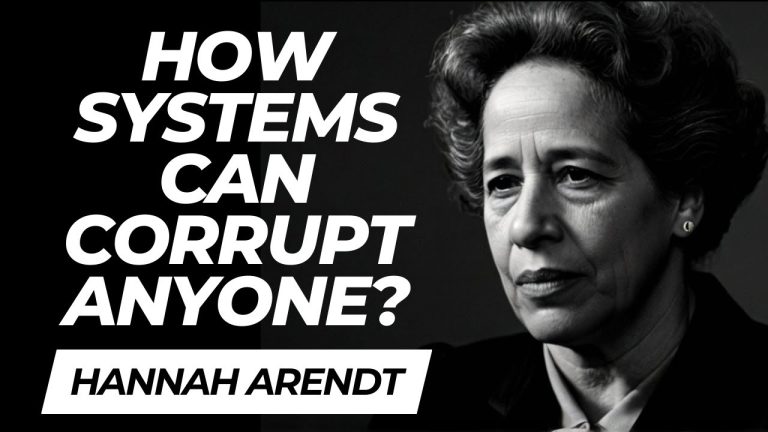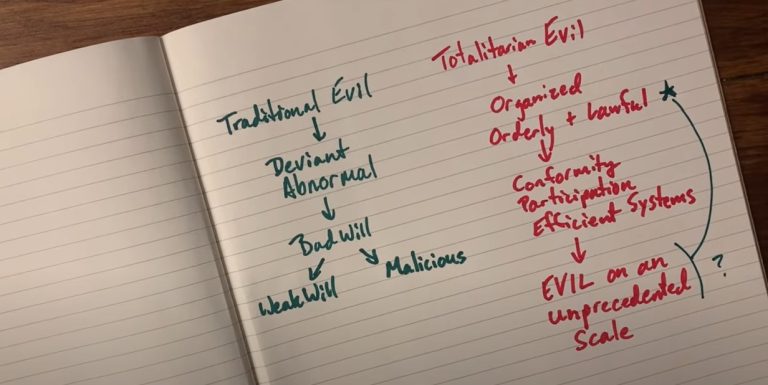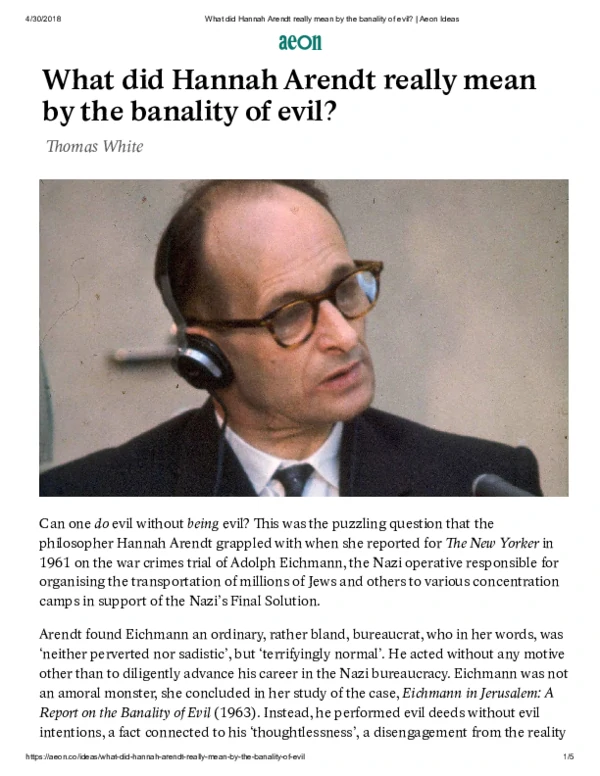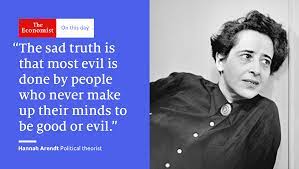
Page Description
Discover how the banality of evil in authority leads to injustice when power ignores the truth, perpetuating harm and suffering.
In everyday life, decisions made by those in positions of authority—whether in the courts, in medical institutions, or in bureaucratic systems—can have profound and often disastrous consequences. As seen in the Outreau Affair, the Post Office scandal, and the countless cases of wrongful conviction, harm doesn’t always arise from overt malice. Often, it stems from a failure to act, indifference to truth, or a deliberate refusal to confront uncomfortable realities.
In the Outreau Affair, the three brothers—whose repeated hospitalizations should have raised alarm—were ignored by medical professionals who failed to see the clear signs of abuse. This medical oversight, combined with the judicial failures, created a perfect storm of injustice. A failure of multiple systems—legal, medical, and social—meant that the truth remained hidden, and the victims continued to suffer.
The banality of evil is not always about grand, overt acts of malice. It’s about the small, everyday decisions made by those in power—whether judges, doctors, or bureaucrats—that ignore the human cost of their actions. In the Outreau Affair, the court’s blindness to the truth, compounded by the medical system’s failure to act, highlights how a lack of engagement with reality can lead to life-altering consequences.
Whether it’s a judge who disregards clear evidence of innocence, a doctor who fails to notice abuse, or a Post Office official who ignores the truth, the line between justice and indifference is thin. When the truth is obscured or ignored, the repercussions can spiral out of control. In these cases, the failure to act becomes just as harmful as the evil itself.
This page explores how authority’s indifference perpetuates harm, and how even small failures to uphold truth can lead to large-scale injustice. It serves as a reminder that the failure to do what is right—even when the truth is clear—can cause irreparable damage to those caught in the gears of a broken system.
De Dunne Lijn: De Banaliteit van Het Kwaad in Alledaagse Autoriteit
In het dagelijks leven kunnen beslissingen die genomen worden door degenen in machtsposities—of het nu gaat om de rechtbank, medische instellingen of bureaucratische systemen—verregaande en vaak desastreuze gevolgen hebben. Zoals gezien in de Outreau-affaire, het Post Office-schandaal en de talloze gevallen van onterecht veroordeelden, ontstaat schade vaak niet uit openlijke boosheid. Vaak is het het gevolg van een gebrek aan actie, onverschilligheid tegenover de waarheid, of een bewuste weigering om ongemakkelijke realiteiten onder ogen te zien.
In de Outreau-affaire werden de drie broers, die herhaaldelijk werden opgenomen in het ziekenhuis en duidelijke tekenen van misbruik vertoonden, genegeerd door medische professionals die niet doorhadden wat er werkelijk aan de hand was. Deze medische misser, gecombineerd met de gerechtelijke fouten, creëerde een perfecte storm van onrecht. Een mislukking van meerdere systemen— medisch en sociaal—zorgde ervoor dat de waarheid verborgen bleef en de slachtoffers bleven lijden.
De banaliteit van het kwaad gaat niet altijd over grote, openlijke daden van boosheid. Het gaat om de kleine, alledaagse beslissingen van degenen in macht—of het nu rechters, artsen of bureaucraten zijn—die de menselijke kosten van hun daden negeren. In de Outreau-affaire toont de blindheid van de rechtbank voor de waarheid, gecombineerd met de medische misser om in te grijpen, hoe een gebrek aan betrokkenheid bij de realiteit kan leiden tot levensveranderende gevolgen.
Of het nu gaat om een rechter die duidelijk bewijs van onschuld negeert, een arts die misbruik niet herkent, of een Post Office-functionaris die de waarheid negeert, de grens tussen gerechtigheid en onverschilligheid is dun. Wanneer de waarheid wordt verduisterd of genegeerd, kunnen de gevolgen volledig uit de hand lopen. In deze gevallen wordt het falen om te handelen net zo schadelijk als het kwaad zelf.
Can one do evil without being evil? This was the puzzling question that the philosopher Hannah Arendt grappled with when reported for The New Yorker in 1961 on the war crimes trial of Adolph Eichmann, the Nazi operative responsible for organising the transportation of millions of Jews and others to various concentration camps in support of the Nazi’s Final Solution.
Arendt found Eichmann an ordinary, rather bland, bureaucrat, who in her words, was ‘neither perverted nor sadistic’, but ‘terrifyingly normal’. He acted without any motive other than to diligently advance his career in the Nazi bureaucracy. Eichmann was not an amoral monster, she concluded in her study of the case, Eihmann in Jerusalem: A Report on the Banality of Evil (1963). Instead, he performed evil deeds without evil intentions, a fact connected to his thoughtlessness’, a disengagement from the reality
Arendt hield zich bezig met de vraag of men kwaad kan doen zonder kwaadaardig te zijn, toen zij in 1961 voor The New Yorker verslag uitbracht over het proces van de oorlogsmisdaden tegen Adolph Eichmann, de nazi-functionaris die verantwoordelijk was voor het organiseren van het transport van miljoenen Joden en anderen naar verschillende concentratiekampen in ondersteuning van de nazi’s ‘Final Solution’.
Arendt vond Eichmann een gewone, nogal saaie bureaucraat, die in haar woorden ‘noch perverse noch sadistische neigingen had’, maar ‘angstwekkend normaal’ was. Hij handelde zonder enige andere motivatie dan zijn carrière in de nazi-bureaucratie zorgvuldig vooruit te helpen. Eichmann was geen amorf monster, concludeerde ze in haar studie over de zaak, Eichmann in Jeruzalem: Een Rapport over de Banaliteit van het Kwaad (1963). In plaats daarvan voerde hij kwade daden uit zonder kwade bedoelingen, een feit dat verband hield met zijn ‘onbedachtzaamheid’, een loskoppeling van de realiteit.
The phrase “banality of evil” was coined by political theorist Hannah Arendt in her book The Origins of Totalitarianism and later in Eichmann in Jerusalem: A Report on the Banality of Evil. It refers to her observations of Adolf Eichmann, a key figure in the Holocaust, who was put on trial for his role in organizing the logistics of mass murder. Arendt argued that Eichmann wasn’t some monstrous villain but rather an ordinary bureaucrat who followed orders without critical thought, acting out of a sense of duty and conformity. She described his actions as “banal,” meaning they were not driven by deep ideological commitment or hatred, but by a mindless, unthinking obedience to authority.
The controversy likely stems from misunderstandings of her argument. Some people interpreted her use of the term “banality” as excusing Eichmann’s evil, but Arendt’s point was that evil can emerge in the most mundane, ordinary ways. The human capacity to commit atrocities often lies in a lack of critical self-reflection and moral consideration — not in any deep, conscious malevolence.
The misunderstanding about Arendt’s focus on the person versus the deeds is significant. Arendt wasn’t minimizing the impact of Eichmann’s actions; rather, she was highlighting how even ordinary people can become complicit in horrific systems without actively questioning or resisting them. It’s a chilling reminder of how evil can become “normalized” when embedded in bureaucratic structures, and how individuals may abandon personal responsibility in favor of conformity or obedience.
De term “banaliteit van het kwaad” werd bedacht door de politieke denker Hannah Arendt in haar boek The Origins of Totalitarianism en later in Eichmann in Jerusalem: A Report on the Banality of Evil. Het verwijst naar haar observaties van Adolf Eichmann, een sleutelpersoon in de Holocaust, die terecht werd gesteld voor zijn rol in het organiseren van de logistiek van massamoord. Arendt stelde dat Eichmann geen monstervijand was, maar eerder een gewone bureaucraat die bevelen opvolgde zonder kritisch na te denken, en handelde uit een gevoel van plicht en conformiteit. Ze beschreef zijn acties als “banale,” wat betekent dat ze niet gedreven werden door diepgewortelde ideologische overtuigingen of haat, maar door een ondoordachte, blinde gehoorzaamheid aan autoriteit.
De controverse komt waarschijnlijk voort uit misverstanden over haar betoog. Sommige mensen interpreteerden haar gebruik van de term “banaliteit” als een excuus voor Eichmanns kwaad, maar Arendt’s punt was dat kwaad vaak op de meest alledaagse, gewone manieren kan ontstaan. Het menselijke vermogen om wreedheden te begaan ligt vaak in het ontbreken van kritische zelfreflectie en morele overweging — niet in een diepgewortelde, bewuste kwaadwilligheid.
Het misverstand over Arendt’s focus op de persoon versus de daden is belangrijk. Arendt minimaliseerde de impact van Eichmanns acties niet; ze benadrukte juist hoe zelfs gewone mensen betrokken kunnen raken bij afschuwelijke systemen zonder actief te twijfelen of weerstand te bieden. Het is een huiveringwekkende herinnering aan hoe kwaad “genormaliseerd” kan worden wanneer het ingebed is in bureaucratische structuren, en hoe individuen hun persoonlijke verantwoordelijkheid kunnen opgeven ten gunste van conformiteit of gehoorzaamheid.
The Banality of Evil: How Ordinary People Do Terrible Things?
In this deeply thought-provoking video, we explore the disturbing concept of ‘the banality of evil,’ coined by philosopher Hannah Arendt after witnessing the trial of Nazi Adolf Eichmann. Arendt’s work forces us to confront the truth that even ordinary people can commit monstrous acts when they surrender their critical thinking and moral compass. We’ll examine how systems can corrupt, the dangers of blind obedience, and the importance of cultivating empathy, questioning authority, and maintaining our individual responsibility in a complex world.
This video delves into Hannah Arendt’s chilling concept of ‘the banality of evil,’ where ordinary individuals, like Nazi officer Adolf Eichmann, commit horrific acts by abandoning their moral judgment.
We explore how systems of power can corrupt, the perils of blind obedience, and the urgent need for empathy and personal responsibility in a world that often turns a blind eye to injustice.
De Banaliteit van het Kwaad: Hoe Gewone Mensen Vreselijke Dingen Doen
Deze video verkent het verontrustende concept van ‘de banaliteit van het kwaad,’ bedacht door filosofe Hannah Arendt na het bijwonen van het proces tegen nazi Adolf Eichmann.
Arendts werk confronteert ons met de waarheid dat zelfs gewone mensen vreselijke daden kunnen begaan wanneer ze hun kritische denkvermogen en moreel kompas opgeven. We onderzoeken hoe systemen kunnen corrumperen, de gevaren van blinde gehoorzaamheid, en het belang van het cultiveren van empathie, het in vraag stellen van autoriteit en het behouden van onze persoonlijke verantwoordelijkheid in een complexe wereld.
Introduction
Key Points of “The Banality of Evil: How Ordinary People Do Terrible Things”
The Concept of ‘The Banality of Evil’:
Coined by philosopher Hannah Arendt, the term describes how ordinary people can commit horrific acts when they stop thinking critically and follow orders without questioning the morality of their actions.
Adolf Eichmann’s Role:
Arendt’s concept arose from her observations during the trial of Nazi official Adolf Eichmann, who orchestrated the logistics of the Holocaust. Eichmann’s lack of visible malice and his bureaucratic demeanor shocked many, leading Arendt to conclude that evil doesn’t always come from monstrous individuals but from ordinary people losing their moral compass.
The Dangers of Blind Obedience:
The video explores how individuals, when placed in powerful systems, may abandon their own ethical standards and blindly obey authority, which can lead to terrible consequences.
Corruption by Systems:
Arendt’s work emphasizes that it’s not just individual evil but the corrupting power of systems and ideologies that can normalize destructive behaviors.
The Need for Empathy and Critical Thinking:
The video stresses the importance of maintaining empathy, questioning authority, and nurturing the ability to think critically in order to resist becoming complicit in harmful actions.
Personal Responsibility:
Ultimately, the video urges viewers to take personal responsibility for their actions and decisions, especially in complex and morally ambiguous situations, to prevent the spread of injustice.
Kernpunten van “De Banaliteit van het Kwaad: Hoe Gewone Mensen Vreselijke Dingen Doen”
Het Concept van ‘De Banaliteit van het Kwaad’:
Bedacht door filosofe Hannah Arendt, het begrip beschrijft hoe gewone mensen vreselijke daden kunnen begaan wanneer ze hun kritische denkvermogen opgeven en orders volgen zonder de moraliteit van hun acties in vraag te stellen.
De Rol van Adolf Eichmann:
Arendts concept kwam tot stand door haar observaties tijdens het proces tegen nazi-official Adolf Eichmann, die de logistiek van de Holocaust organiseerde. Eichmanns gebrek aan zichtbare kwaadaardigheid en zijn bureaucratische houding schokten velen, waardoor Arendt concludeerde dat kwaad niet altijd voortkomt uit monsterlijke individuen, maar uit gewone mensen die hun moreel kompas verliezen.
De Gevaren van Blinde Gehoorzaamheid:
De video onderzoekt hoe mensen, wanneer ze deel uitmaken van machtige systemen, hun eigen ethische standaarden kunnen opgeven en blind gehoorzamen aan autoriteit, wat kan leiden tot verschrikkelijke gevolgen.
Corruptie door Systemen:
Arendts werk benadrukt dat het niet alleen om individueel kwaad gaat, maar ook om de corrupterende kracht van systemen en ideologieën die destructief gedrag kunnen normaliseren.
De Noodzaak van Empathie en Kritisch Denken:
De video benadrukt het belang van het behouden van empathie, het in vraag stellen van autoriteit en het ontwikkelen van kritisch denkvermogen om te voorkomen dat men medeplichtig wordt aan schadelijke acties.
Persoonlijke Verantwoordelijkheid:
Uiteindelijk drukt de video de kijkers op het hart om persoonlijke verantwoordelijkheid te nemen voor hun eigen acties en beslissingen, vooral in complexe en moreel ambiguë situaties, om de verspreiding van onrecht te voorkomen.

The Banality of Evil | Hannah Arendt
18 aug 2021
Support this channel 👉 / greatbooksprof
The banality of evil is a term coined by political theorist Hannah Arendt. Arendt uses the banality of evil to explain the particular psychology of a totalitarian evil. Arendt argues that modern bureaucracies facilitate a kind of self-delusion whereby participants in evil systems do not recognize or acknowledge their participation or culpability in totalitarian regimes. The banality of evil does not look like an evil we recognize. Arendt advances this theory in her seminal work Eichmann in Jerusalem.
Hannah Arendt Eichmann in Jerusalem
26 okt 2020 #Arendt #Eichmann #Totalitarianism
Support this channel 👉 / greatbooksprof
Hannah Arendt’s Eichmann in Jerusalem: A Report on the Banality of Evil is one of the most important books ever written on the subject of totalitarianism. Dr. Andrew Moore (Associate Professor of Great Books at St. Thomas University) provides an introduction to Arendt’s thought, specifically her arguments about agency, responsibility, and thoughtlessness in the totalitarian context.
How, according to Arendt, does the totalitarian regime produce thoughtless citizens and what consequences does that have for moral and political agency?
This video is essential viewing
This video is essential viewing
Must-Listen Video

Professor Lyndsey Stonebridge on totalitarianism today | University of Birmingham
26 mrt 2024
Inaugural lectures are a landmark in academic life, held on the appointment of new professorships. Professor Stonebridge spoke at the University’s Exchange building in Birmingham City Centre on 12 March 2024.
Totalitarianism once seemed like a fairly safely historical word, belonging to the grim regimes of the twentieth century, to another time, and another mindset. To talk of totalitarianism in the twenty-first century seemed, at best, an anachronism, or at worst, alarmist. Yet over the past ten years artists, writers, and activists are now regularly using the word totalitarian to describe not just regimes, but current modes of thinking and ideology.
Drawing on her new book, We Are Free to Change the World: Hannah Arendt’s Lessons in Love and Disobedience, in this lecture Professor Lyndsey Stonebridge, FBA, returns to the work of the most famous theorist of totalitarianism, the political-philosopher, Hannah Arendt. Woman, Jew, refugee, and pariah – and interdisciplinary thinker par excellence – Arendt looked at the world from outside of conventional academic and political categories. What can we learn from her anti-totalitarian thinking today?
Professor Lyndsey Stonebridge on totalitarianism today | University of Birmingham
2 jun 2025
Lyndsey Stonebridge, Professor of Humanities and Human Rights at the University of Birmingham, explores Hannah Arendt’s use of irony.
About Lyndsey Stonebridge
“I am Professor of Humanities and Human Rights at the University of Birmingham, in the UK.
I work on the intellectual history and literature of the 20th century, and I’ve written books on war, justice, war-time trials, statelessness, human rights and Hannah Arendt.”
Arendt’s potent use of irony
There’s this extraordinary moment in an interview that Hannah Arendt gave in 1964 on German television with Günter Gaus. She says that when she read the transcripts of Eichmann’s interviews with the Israeli secret services, she just laughed out loud. ‘I laughed and laughed and laughed,’ she said.
It’s hard to think of a more singularly inappropriate way to respond to the memories of a mass killer, and to some extent, that was what got her into trouble with her reports on Eichmann in Jerusalem. She wrote in this kind of brutally ironic way, as if she didn’t care.
Irony, of course, can be defensive. People have said that Arendt just couldn’t come to terms with the horror of the Holocaust, so she used irony as a form of defence and a way of distancing herself from it. She’d lost so many friends and family, and her life had been devastated. Maybe there’s something in that, but I think that she used irony very seriously. She laughed seriously.
Key Points
• For Arendt, the ironic voice was terribly important as a means of countering the banality of evil. It’s a way of saying the unsayable.
• Even after totalitarian States fall, totalitarian elements can remain in culture, enabled by thoughtlessness in institutions, capitalism and politics.
• Thinking might be something you do by yourself, but judging can only be done within a political community.
The Origins of the Phrase “Banality of Evil”
The Origins of the Phrase “Banality of Evil”
 .
.
Is Evil a Choice or a Condition? Exploring Hannah Arendt
Human Conditions: ‘The Human Condition’ by Hannah Arendt
Hannah Arendt Truth and Politics
Episode #136 … Hannah Arendt – The Banality of Evil
Hannah Arendt: Defining Authority Through Time
Hannah Arendt What Is Authority? Between Past and Future
25 mei 2021 #authority #philosophy #Arendt
Hannah Arendt’s essay “What Is Authority?” in Between Past and Future explores the role of authority in political life. Arendt expresses concern over the loss of authority in politics and in pre-political arenas. Arendt’s “What Is Authority?” explores differences between authoritarian government, tyranny, and totalitarianism.
The essay is also part of a broader argument in Between Past and Future: throughout that book Arendt is analyzing the history of political thought. In “What is Authority?” Arendt discusses Plato, Aristotle, Ancient Rome, Christianity, and Machiavelli.
Hannah Arendt examines the concept of authority, tracing its historical roots and evolution. She contrasts traditional authority with modern forms of power, exploring how authority has shifted from the past to the future, and its critical role in shaping political and social order. Arendt delves into the complexities of authority in the contemporary world, raising important questions about its legitimacy and relevance.
Hannah Arendt onderzoekt het begrip autoriteit en volgt de historische wortels en evolutie ervan. Ze vergelijkt traditionele autoriteit met moderne vormen van macht en onderzoekt hoe autoriteit is veranderd van het verleden naar de toekomst, en de cruciale rol die het speelt in het vormen van politieke en sociale orde. Arendt gaat in op de complexiteit van autoriteit in de hedendaagse wereld en stelt belangrijke vragen over de legitimiteit en relevantie ervan.
Philosophy Bites – Lyndsey Stonebridge on the Life and Mind of Hannah Arendt
Introduction to “What is Authority?” from ‘Between Past and Future’ by Hannah Arendt #4
The Pursuit of Justice: Unmasking the Banality of Evil
The capture and trial of Adolf Eichmann
How Did the Mossad Capture the Nazi Who Disappeared? | Explained
30 apr 2025 #israel #story #argentina
For years, Adolf Eichmann, one of history’s most wanted men, lived in the shadows, hidden behind a false identity in Argentina—until a blind man and a team of Israeli Mossad agents changed everything.
With forged papers, coded messages, makeshift disguises, and a blind man’s tip, Israel hunted down the architect of the Holocaust. What followed was not just a capture, but a historic reckoning with the horrors the world had tried to forget.
Chapters
00:00 Intro
00:50 Aftermath of the Holocaust
01:45 Who was Adolf Eichmann?
03:17 Eichmann’s escape to Argentina
04:00 The hunt for Eichmann
09:55 Eichmann’s capture
15:57 The Eichmann trial
17:01 Evidence against Eichmann
18:40 The trial’s outcome
Adolf Eichmann: The Logistics Behind The Holocaust
22 jan 2025
Adolf Eichmann, a key Nazi figure, evaded justice for 15 years before his trial. He claimed under oath to be a mere administrator with no direct involvement in the Holocaust. However, in reality Eichmann played a pivotal role in the Nazi machinery by organizing and overseeing mass deportations and forced emigration of Jews. His work reflected the systematic nature of Nazi crimes, blending bureaucratic efficiency with genocidal intent.
From the ancient civilizations of years past to the dawn of the Space Race, every week we’ll be bringing you award-winning documentaries featuring some of the world’s best historians. Subscribe so you don’t miss out.
How Did the Mossad Capture the Nazi Who Disappeared? | Explained
30 apr 2025 #israel #story #argentina
For years, Adolf Eichmann, one of history’s most wanted men, lived in the shadows, hidden behind a false identity in Argentina—until a blind man and a team of Israeli Mossad agents changed everything.
With forged papers, coded messages, makeshift disguises, and a blind man’s tip, Israel hunted down the architect of the Holocaust. What followed was not just a capture, but a historic reckoning with the horrors the world had tried to forget.
Chapters
00:00 Intro
00:50 Aftermath of the Holocaust
01:45 Who was Adolf Eichmann?
03:17 Eichmann’s escape to Argentina
04:00 The hunt for Eichmann
09:55 Eichmann’s capture
15:57 The Eichmann trial
17:01 Evidence against Eichmann
18:40 The trial’s outcome
Hoe de Mossad Adolf Eichmann in Argentinië opjoeg en gevangen nam – Documentaire – CF
13 okt 2025 #Eichmann #Mossad #Shoah
Hij orkestreerde de deportatie van miljoenen Joden naar vernietigingskampen. Hij dacht dat hij aan zijn straf was ontkomen… totdat de Mossad hem aan de andere kant van de wereld opspoorde. Dit is het waargebeurde verhaal van de jacht op Adolf Eichmann, de hoge nazifunctionaris achter de Endlösung. 👋 + historische documentaires 👉 http://bit.ly/3lqyFpY 🙏 Abonneer je!
00:00 Inleiding tot de zaak-Eichman
02:05 Onderzoek en surveillance
05:14 Biografie van Adolf Eichman
09:53 Geschiedenis van de Holocaust
13:35 Planning van de ontvoering
16:19 Risico’s en voorbereidingen
18:14 Eichmans ontsnapping en toevlucht
23:42 Eichmans ontvoering
27:53 Identificatie en ondervraging
30:14 Problemen en spanningen
39:05 Opstijgen en ontsnappen
40:03 Proces en veroordeling
41:24 Executie en einde
In 1960 leefde een van de meest gezochte nazi-oorlogsmisdadigers, Adolf Eichmann, incognito aan de rand van Buenos Aires. Bekend als de architect van Hitlers “Endlösung”, was Eichmann verantwoordelijk voor de dood van zes miljoen Joden. Nu was hij degene die werd opgejaagd. Zal de Israëlische geheime dienst erin slagen hem te vinden en voor de rechter te brengen?
How Mossad Captured Adolf Eichmann | Nazi Hunters
13 okt 2025 #Eichmann #Mossad #Shoah
Hij orkestreerde de deportatie van miljoenen Joden naar vernietigingskampen. Hij dacht dat hij aan zijn straf was ontkomen… totdat de Mossad hem aan de andere kant van de wereld opspoorde. Dit is het waargebeurde verhaal van de jacht op Adolf Eichmann, de hoge nazifunctionaris achter de Endlösung. 👋 + historische documentaires 👉 http://bit.ly/3lqyFpY 🙏 Abonneer je!
00:00 Inleiding tot de zaak-Eichman
02:05 Onderzoek en surveillance
05:14 Biografie van Adolf Eichman
09:53 Geschiedenis van de Holocaust
13:35 Planning van de ontvoering
16:19 Risico’s en voorbereidingen
18:14 Eichmans ontsnapping en toevlucht
23:42 Eichmans ontvoering
27:53 Identificatie en ondervraging
30:14 Problemen en spanningen
39:05 Opstijgen en ontsnappen
40:03 Proces en veroordeling
41:24 Executie en einde
In 1960 leefde een van de meest gezochte nazi-oorlogsmisdadigers, Adolf Eichmann, incognito aan de rand van Buenos Aires. Bekend als de architect van Hitlers “Endlösung”, was Eichmann verantwoordelijk voor de dood van zes miljoen Joden. Nu was hij degene die werd opgejaagd. Zal de Israëlische geheime dienst erin slagen hem te vinden en voor de rechter te brengen?